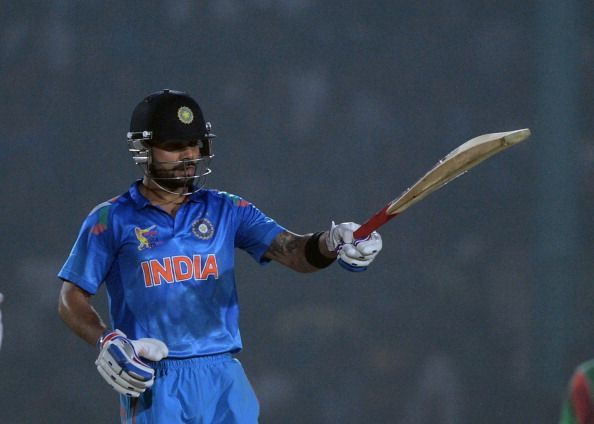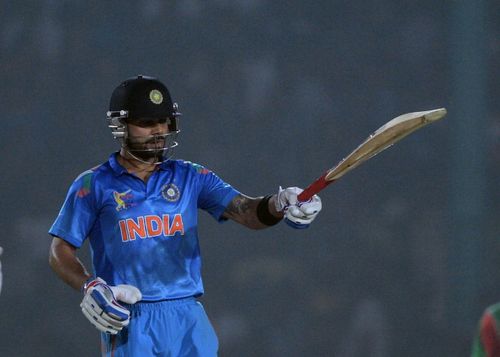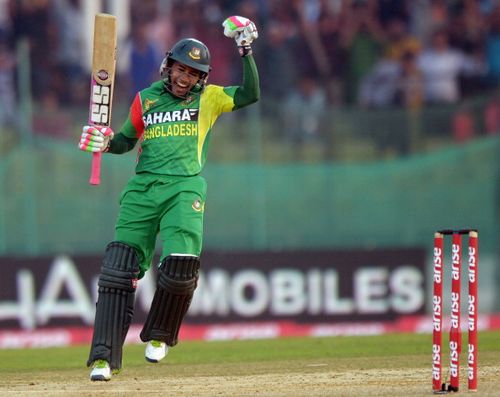
Asia Cup 2014: Bangladesh vs India - Kohli, Rahane and Shami star for visitors

Virat Kohli played a captain’s knock in India’s Asia Cup opener
It was nearly two years ago that the whole of India had stood up in awe of the feat achieved by one of the most loved virtuosos of the nation – it was in the match against Bangladesh in the last edition of the Asia Cup that Sachin Tendulkar had finally managed to get to the astronomical figure of ‘100 international tons’, after almost a year arduously spent waiting for the milestone to arrive.
This game, though, became entrenched in the memories of countless cricket aficionados not just because of the Sachin show, but because the perennial underdogs of world cricket – Bangladesh – managed to upstage world champions India in a brilliant run-chase.
Nearly two years after that fateful day, India took on Bangladesh again in their first game of the Asia Cup 2014, with the burning desire to amend the wrongdoings of their last encounter.
Apart from the redemption that India were desperately seeking at the start of the match, in the aftermath of a disastrous two month long winless ordeal spent abroad, this opening game against Bangladesh was important primarily because of two reasons –
Firstly, the change of guard – soothsayers have been calling for the head of MS Dhoni following his continued stretch of abysmal captaincy stints away from home. The absence of MSD, on account of a mysterious side strain, gives Virat Kohli the much awaited opportunity to flex his leadership muscles and let the world know that the Indian team does have potent successors for Dhoni.
Secondly, the absence of Dhoni has imparted an altogether different hue to the Indian middle order. The just concluded encounter with Bangladesh and the Asia Cup, in the long run, shall determine whether or not India can cope with the absence of ‘arguably the best finisher in ODIs’.
The ground conditions in Bangladesh in the late evenings must have weighed heavily on new captain Virat Kohli’s mind when he decided to take the field after winning the toss. And the decision, as most argued, was the safest way to kick-start the proceedings for a team that had undergone a few changes following traumatic experiences last winter abroad.
The Indian bowlers started well – with Mohammed Shami setting the tempo with the wicket of Shamsur Rehman in the 6th over; Bhuvneshwar Kumar played second fiddle to Shami and operated with quintessential accuracy during the first ten overs.
The surprise of the day arrived when Ravichandran Ashwin was called upon to bowl in the 13th over – the very first ball of his spell resulted in the wicket of Mominul Haque. The off spinner’s action appeared to have undergone a massive change following his exclusion from the team in New Zealand and South Africa on many occasions.
Commentators, most of whom were far from being pleasantly amused by this novel bowling action of Ashwin, opined that the off spinner had undergone a subtle ‘Narine-isation’ in the last few weeks. The fruits of this transformation, however, shall become clear only when Ashwin makes a comeback after the extended lull and doesn’t just rely on the quality of the tracks to exhibit his bowling prowess.
The fall of two wickets within the first 15 overs ruffled a few feathers in the hosts’ camp but they were quickly settled by the 133-run stand between skipper Mushfiqur Rahim and wicket keeper batsman Anamul Haque.
The duo held their nerves in the period when the Indians were on the ascent after taking the two wickets at the start of the innings, and quickly galvanized their stolidity into a graceful combination of aggressive stroke-play and crafty milking of singles and doubles during the middle overs.
The lion’s share of the aggression displayed by Rahim and Haque during this partnership, was borne by the errant Varun Aaron who was wayward in line and length during his 7.5 overs which were blown apart for 74 runs; the consolation for the hapless Aaron manifested itself in the form of the wicket of Haque in the 37th over.
Skipper Rahim, though, never let the momentum subside and continued to punish the Indian bowlers for runs every now and then, ultimately scoring a majestic century before falling to Mohammed Shami in the final over of the innings.

Skipper Mushfiqur Rahim made a brilliant hundred
Effective bowling from Shami and Bhuvneshwar Kumar in the death overs ensured that India had tied the hosts down to a total of 279/7; a four wicket haul for the former was a good enough reward for the hard work he put in today.
While most of us expected the Indian openers to blast their way towards the target and make a mockery of the Bangladeshi bowling attack right form the very start, Rahim and his troops had other plans in mind to upset the Indian cart. So tight and accurate was the bowling in the first ten overs that the Indian openers – Rohit Sharma and Shikhar Dhawan – could barely limp into the chase; Rubel Hossain and Mashrafe Mortaza were at their very best in keeping both the swashbuckling Indians subdued for an elongated period of time.
The hard work paid off as both the openers fell prey to the ‘get out of jail attitude’ and departed in successive overs after having somehow managed to take India past 50 in 11 overs.
It was after this bizarre period of Bangladeshi dominance that the Indians finally got their act together as Virat Kohli and Ajinkya Rahane paired up to script a record breaking 213-run stand for the third wicket.
While Kohli kept the bowlers on a tight leash with his magnificent pulls and cover drives, Rahane anchored the Indian innings with characteristic calmness and grit. The partnership tormented the Bangladeshis for nearly 35 overs, during which the Indian skipper bagged yet another century (19th in ODIs) and Rahane pampered himself with a classy 73 as India romped home with a over and six wickets to spare.
What ended as an easy victory for the Indians may have taken an ended in an altogether different result in the absence of the surety that Kohli brings to the middle order with startling regularity.
Thus, issues with the openers and the bowling combinations need to be sorted out well before the big games against Sri Lanka and Pakistan arrive at India’s doorstep.